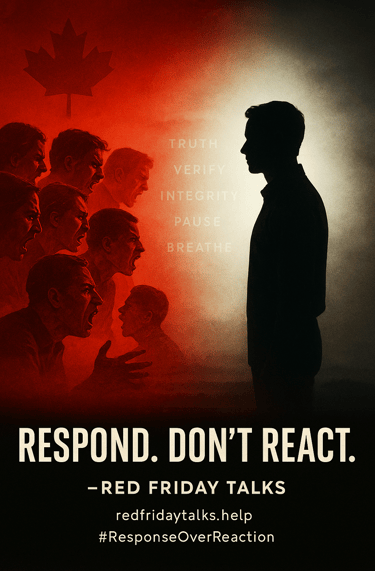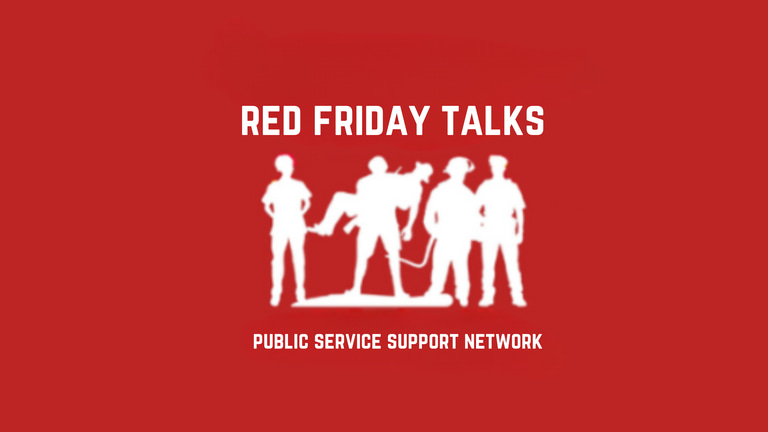When Fight-or-Flight Kills Accountability — And How to Bring It Back
When the amygdala hijacks reason, people stop thinking and start reacting. Accountability dies, gossip grows, and reputations get destroyed. Here’s how to fix it — before stress turns good people into bad actors.
By Bob McTaggart | RED Friday Field Notes | redfridaytalks.help
10/5/20254 min read


Have You Noticed This Lately?
It feels like accountability has gone missing.
Someone spreads a rumor. A crowd piles on. Facts disappear.
When the truth comes out, nobody apologizes — they just justify.
Sound familiar?
I recently saw a case where a man was wrongfully accused of misrepresenting himself. A small group decided to “blacklist” him. When confronted with evidence that he was innocent, the ringleader said, “Well, he should’ve known better.”
No responsibility. No humility. Just deflection.
That’s not just poor behavior — it’s neuroscience at work.
Why People Lose Accountability Under Stress
When we feel threatened, even socially, the brain’s amygdala takes over.
That’s our survival center — the “fight or flight” system.
But here’s the kicker: when the amygdala lights up, the prefrontal cortex (the logical, reasoning part of the brain) shuts down.
Harvard’s Amy Arnsten calls this the amygdala hijack. Under stress, we literally lose access to rational thought, empathy, and judgment.
A 2015 Nature Reviews Neuroscience study found that stress hormones weaken prefrontal networks within minutes. A 2017 paper by Bruce McEwen showed chronic stress reshapes these brain areas — making us impulsive, anxious, and reactive.
So when you see someone double down instead of apologize, remember — their biology is in survival mode, not accountability mode.
Social Media: The Outrage Multiplier
Outrage is contagious.
Every like, share, or comment rewards quick judgment and punishes nuance.
Psychologist Molly Crockett explains that outrage is “socially rewarded online.” The more we lash out, the more attention we get.
That turns digital spaces into emotional echo chambers — and spreads misinformation like wildfire.
When Gossip Crosses the Legal Line
There’s also a legal side to this. False statements that damage someone’s reputation are defamation.
Slander = spoken lies
Libel = written or published lies
To prove defamation, a person generally needs to show:
A false statement of fact, not opinion.
Publication to someone else.
Damage to reputation or livelihood.
Sometimes malice or reckless disregard for truth.
If you help spread a false story, even unintentionally, you could be liable.
(This isn’t legal advice — just general information.)
Reaction vs Response — The Red Friday Model
At Red Friday Talks, we train one foundational skill:
Respond. Don’t react.
Reaction
Response
Fast, emotional
Slow, deliberate
Blames
Verifies
Assumes
Checks facts
Escalates
Repairs
A reaction feels powerful but rarely helps.
A response takes a breath, looks at evidence, and aims for truth.
This shift can prevent both emotional and legal disasters.
The 48-Hour Rule
If someone brings you a serious accusation or rumor, pause.
Take 48 hours before making it public.
Verify facts. Contact the person directly. Ask for documentation.
In that time, the truth usually surfaces — or at least the story softens.
The Red-Flag Check
Before you hit “share” or “send”:
Is this a fact or opinion?
What’s my source?
Has the person had a chance to respond?
You’ll be amazed how many false stories crumble under those three questions.
How to Interrupt an Amygdala Hijack
At Red Friday, we use a tool called PLB — Pause, Label, Breathe.
Pause. Don’t type, post, or speak yet.
Label. Name what you’re feeling (“I’m angry,” “I’m embarrassed”).
Breathe. One minute of slow, nasal breathing.
That simple act re-engages your prefrontal cortex — bringing reason back online.
What Leaders and Teams Can Do
Build a Verification Policy.
Don’t act on allegations without direct confirmation.Train Response Skills.
Teach emotional regulation and peer support.Reward Repair, Not Retaliation.
When someone admits a mistake and apologizes, highlight it as strength, not weakness.Create Psychological Safety.
Teams that feel safe think better, speak up earlier, and self-correct faster.
Why It Matters
Accountability used to mean you stood by your word.
Now, it too often means “I’ll defend my narrative no matter what.”
But leadership — real leadership — requires humility and correction.
If you were wrong, own it.
If you spread something false, retract it.
If you hurt someone, apologize directly.
That’s how communities heal. That’s how credibility grows.
A Red Friday Exercise
Try this 30-minute team exercise this week:
Step 1 (10 minutes): Explain how stress hijacks thinking.
Step 2 (10 minutes): Role-play a rumor scenario — practice verifying instead of reacting.
Step 3 (10 minutes): Ask each person to share a time they reacted too fast.
It’s fast, powerful, and culture-changing.
The Science Behind Response Over Reaction
Arnsten (2015): Stress hormones impair the prefrontal cortex, reducing rational thought.
McEwen (2017): Chronic stress rewires the brain, promoting fear over reason.
Girotti et al. (2017): Chronic stress changes decision-making patterns.
Crockett (2022): Online outrage is addictive because it triggers social reward loops.
That’s why our model works. It’s not “soft skills” — it’s neuroscience in action.
Repair Fast — Or Lose Trust Forever
If you realize you were wrong, fix it publicly.
Be specific. Say who was affected, what was wrong, and how you’re correcting it.
Avoid vague “if anyone was offended” statements.
Real accountability says: “I got this wrong. Here’s what I’ve done to make it right.”
Repair builds credibility faster than perfection ever will.
The Red Friday Way
At Red Friday Talks, we don’t just talk about mental health — we build it into the culture.
We teach peer support, de-escalation, and Response-over-Reaction as survival skills for veterans, first responders, and the communities around them.
We believe that when people understand how their brain works, they make better decisions — online and off.
And we’re proving that compassion, structure, and science can rebuild accountability where outrage has taken over.
What we can learn
We all make mistakes.
But integrity isn’t about being perfect — it’s about what you do next.
So before you react, breathe.
Before you judge, verify.
And before you share, be sure.
That’s how we bring accountability back — one response at a time.
Written for RED Friday Field Notes by Bob McTaggart
Join the movement at www.redfridaytalks.help
#RedFridayTalks #Accountability #PeerSupport #CriticalThinking #MentalFitness #AmygdalaHijack #Leadership #SocialMediaEthics #ResponseOverReaction #VeteranSupport #CommunityTrust #Slander #Defamation
